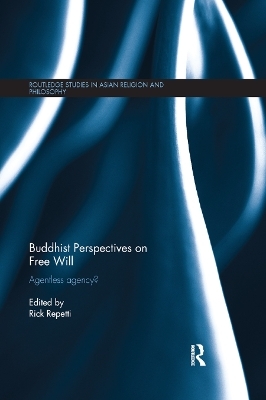
Buddhist Perspectives on Free Will
Routledge (Verlag)
978-0-367-87485-8 (ISBN)
Throughout the history of Buddhism, little has been said prior to the Twentieth Century that explicitly raises the question whether we have free will, though the Buddha rejected fatalism and some Buddhists have addressed whether karma is fatalistic. Recently, however, Buddhist and Western philosophers have begun to explicitly discuss Buddhism and free will.
This book incorporates Buddhist philosophy more explicitly into the Western analytic philosophical discussion of free will, both in order to render more perspicuous Buddhist ideas that might shed light on the Western philosophical debate, and in order to render more perspicuous the many possible positions on the free will debate that are available to Buddhist philosophy. The book covers:
Buddhist and Western perspectives on the problem of free will
The puzzle of whether free will is possible if, as Buddhists believe, there is no agent/self
Theravāda views
Mahāyāna views
Evidential considerations from science, meditation, and skepticism
The first book to bring together classical and contemporary perspectives on free will in Buddhist thought, it is of interest to academics working on Buddhist and Western ethics, comparative philosophy, metaphysics, philosophy of mind, philosophy of action, agency, and personal identity.
Rick Repetti is Professor of Philosophy at Kingsborough Community College, CUNY, USA. He is the author of The Counterfactual Theory of Free Will (2010), as well as several articles on Buddhism, meditation, free will, and philosophy of religion.
Introduction 1. Why the Buddha Did Not Discuss ‘the Problem of Free Will and Determinism’
2. Why There Should Be a Buddhist Theory of Free Will
3. Uses of the Illusion of Agency: Why Some Buddhists Should Believe in Free Will
4. Just Another Word for Nothing Left to Lose: Freedom, Agency and Ethics for Mādhyamikas
5. Negative Dialectics in Comparative Philosophy: The Case of Buddhist Free Will Quietism
6. Free Will and the Sense of Self
7. What Am I Doing?
8. Freedom from Responsibility: Agent-Neutral Consequentialism and the Bodhisattva Ideal
9. Free Will, Liberation and Buddhist Philosophy
10. Buddhism and Free Will: Beyond the ‘Free Will Problem’
11. Degrees of Freedom: The Buddha’s Implied Views on the (Im)possibility of Free Will
12. Buddhist Paleocompatibilism
13. Shifting Coalitions, Free Will, and the Responsibility of Persons
14. Psychological versus Metaphysical Agents: A Theravāda Buddhist View of □Free Will and Moral Responsibility
15. Emotions and Choice: Lessons from Tsongkhapa
16. Grasping Snakes: Reflections on Free Will, Samādhi, and Dharmas
17. Agentless Agency: The Soft Compatibilist Argument from Buddhist Meditation, Mind-Mastery, Evitabilism, and Mental Freedom
| Erscheinungsdatum | 16.12.2019 |
|---|---|
| Reihe/Serie | Routledge Studies in Asian Religion and Philosophy |
| Verlagsort | London |
| Sprache | englisch |
| Maße | 156 x 234 mm |
| Gewicht | 353 g |
| Themenwelt | Geisteswissenschaften ► Philosophie ► Östliche Philosophie |
| Geisteswissenschaften ► Religion / Theologie ► Buddhismus | |
| ISBN-10 | 0-367-87485-7 / 0367874857 |
| ISBN-13 | 978-0-367-87485-8 / 9780367874858 |
| Zustand | Neuware |
| Haben Sie eine Frage zum Produkt? |
aus dem Bereich


